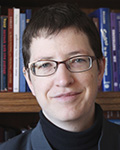2015
Jessica A. Boon
- Assistant Professor
- University of North Carolina at Chapel Hill

Abstract
During Castile’s transition from a pluralistic Middle Ages to a strongly Catholic Golden Age, devotions focused on Jesus’ suffering body (his Passion) became the nexus linking popular culture and high theology, written narrative and oral performance, men’s and women’s spirituality, and Jewish-Christian cultural divides. Spanish Passion provides the first intensive study of the place of body, especially the bodies of Jesus, Mary and the Jews, in Castilian religious experience during the early empire, drawing on methodologies from literary studies, material culture, gender studies, Jewish studies, history of science, and postcolonial theory. The early modern Castilian devotional imagination focused on a tortured son, a divinized virginal mother, and a stereotyped religious “other,” a triumvirate of marginalized, wounded bodies foundational to the complex gender and racial/religious constructs exported across the globe in the first half of the sixteenth century.

